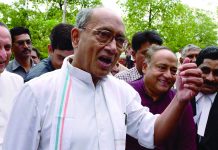
The Ladakh Tourist Trade Alliance’s opposition to outside investment reflects their concerns about preserving unique identity and sustainable development of Ladakh as a tourism destination. It also wants to protect local interests and the fragile ecosystem of the region, writes Riyaz Wani
The Ladakh Tourist Trade Alliance (LTTA), a coalition of trade, tourism, religious, and political organizations in Leh, recently passed a resolution opposing investment by outsiders in the tourism sector of Ladakh. The alliance warned that if such investments continue, they would impose restrictions on these investors through non-cooperation from the local travel trade fraternity, as well as community and political organizations.
The alliance, comprising several prominent associations such as the All Ladakh Tour Operators Association Leh, All Ladakh Hotel and Guest House Association Leh, Ladakh Taxi Operators Cooperative Union Leh, and others, joined forces with various religious and political bodies in a meeting held in Leh. Their collective aim is to safeguard the tourism industry of Ladakh and protect the interests of the local people.
According to the Chairman of the Ladakh Tourist Trade Alliance (LTTA), P T Kunzang, the resolution seeks to preserve Ladakh as a unique tourist destination, protect local entrepreneurship and livelihoods, and safeguard the fragile ecosystem of the region.

“The resolution seeks preservation of Ladakh as a unique tourist destination and for protection of the avenues of entrepreneurship and livelihood of the local people, to safeguard the fragile ecosystem and oppose investment, in any form, in the tourism sector from outside the region,” Kunzang told reporters at a press conference in Leh.
“It was further resolved that during any instance of exploitation of this valuable local resource base in the shape of investment from outside sources, hidden or declared, direct or through any local agency, the local community and trade bodies will impose restrictions against such individuals, businesses or tourist trade enterprises,” he further said.
Ladakh has experienced significant growth in its tourism sector over the years, with the number of tourists increasing from 527 in 1974 to 327,000 in 2018. This sector plays a crucial role in the local economy, providing income and employment opportunities for the majority of the population.
The LTTA’s opposition to outside investment reflects their concerns about preserving the unique identity and sustainable development of Ladakh as a tourism destination. They have made it clear that they want to preserve local interests and the fragile ecosystem of the region while maintaining the economic benefits derived from tourism.
As the debate over tourism development continues in Ladakh, it remains to be seen how the local administration will address the concerns raised by the LTTA and strike a balance between sustainable growth and the preservation of local identity and resources.
Although people of Leh, one of the two districts of Ladakh, celebrated the grant of union territory status to the region on August 5, 2019, they have since woken up to a sobering reality. The refrain goes that the UT status has made New Delhi a direct ruler of the region with little role in the governance for its people. What is more, Ladakhis fear their small population will be overrun by the influx of people from other parts of India without any constitutional safeguards that forbids outsiders from settling in the region.
The total population of Ladakh, according to the 2011 census is 2.74 lakh. While Leh with a population of 1,33,487 is Buddhist majority, Kargil with a population of 1,40,802 is Muslim majority.

But while the resentment is brewing, and also being politically expressed, there is little effort afoot to address the deepening concerns. In a resolution in November last year, the Ladakh Hill Development Council (LAHDC) demanded statehood, extension of the sixth schedule, separate Lok Sabha seats for Leh and Kargil – the region’s two districts – and Public Service Commission.
The Apex Body Leh (ABL) and the Kargil Democratic Alliance (KDA), Ladakh have forged a rare political unity. They protest together and also organize strikes jointly. It is for the first time in decades that the two Ladakh districts have been on the same page in pressing the government on their demands.
And now the LTTA, which also represents both the districts, doesn’t want outside investment in tourism in the region. The reason is the same: Ladakhis fear being swamped by the outsiders in every sphere of their economic activity.













